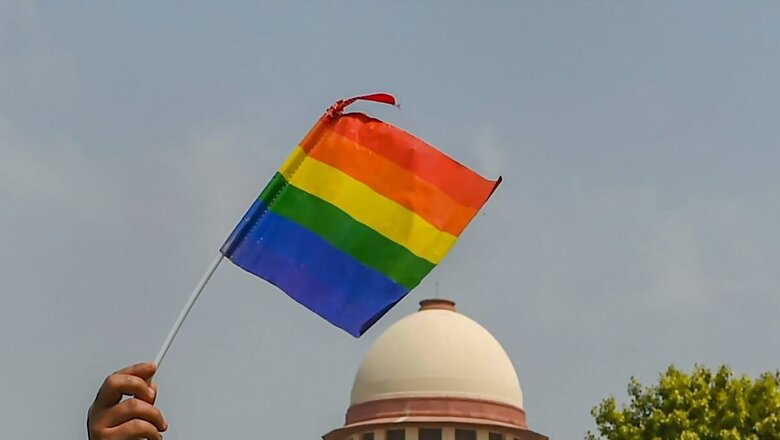
views
The two-decade-long legal fight of the LGBTQ community seeking greater recognition of civil rights has reached an important turning point, with the Supreme Court set to pronounce verdict on the legal validity of same-sex marriages.
The decriminalisation of homosexuality had already set the stage for this day. The LGBTQ community has sought dignity and equality of marriage before the Supreme Court.
As the bench assembles on Tuesday morning to pronounce the crucial verdict, here are some options before the Supreme Court:
DECLARE RIGHT TO MARRIAGE AS A FUNDAMENTAL RIGHT
ARGUMENT IN SUPPORT: Petitioners have argued that the right to marriage should be declared as a fundamental right. It is argued that all civil rights emanate from the institution of marriage. The right to raise a child as a couple, joint financial bank accounts, right to inherit each other’s property or even the right to sign a basic medical consent form are all rights allied to the institution of marriage. Hence, this institution serves as a sine qua non (essential action) for complete exercise of civil rights as a couple. The denial of legal recognition to same-sex partnership is discriminatory and hence must be outlawed.
COUNTER VIEW: If marriage were to be recognised as a fundamental right, it will open a Pandora’s Box where personal laws shall be in direct conflict. This paves the way for dozens of petitions lining up before the Supreme Court. It shall also throw up challenges for various tribal and indigenous customs that are protected under the Sixth Schedule of the Indian Constitution. No religious, tribal, or customary law recognises same-sex partnership or gay marriages.
Recognition of same-sex marriage as a fundamental right shall set the stage for a complete overhaul of the definition of marriage. The question is not on the morality or the righteousness of the issue but rather on whether we are legally, constitutionally, and socially prepared for this overhaul. The jury is still out on that.
KEEP ASIDE PERSONAL LAWS, ALLOW SAME SEX MARRIAGE UNDER SPECIAL MARRIAGE ACT
ARGUMENT IN SUPPORT: During the hearings, there was another suggestion that was debated upon – should the ambit of personal laws be completely put aside and only the domain of the ‘secular laws’ like the Special Marriages Act, 1954, be changed or altered?
The suggestion was that the definition under the Special Marriage Act should be made gender-neutral. Petitioners argued that same-sex couples can be allowed to be registered under this law and this shall pave the way for greater civil rights for the community. It was further argued that any statute of Parliament like the Special Marriages Act cannot make discrimination based on sexual orientation. Hence, the definition of marriage must be made gender neutral to accommodate same-sex couples.
COUNTER VIEW: But even this path is a treacherous one. India, unlike most democratic countries, does not have a uniform civil code. Even if the troublesome aspect of personal laws is put aside for a moment and the Special Marriages Act, 1954 abandons the gendered definition of marriage, the problem is far from over.
The limited rationalisation under the Special Marriage Act shall only augment the complexities under the present system. The so-called ‘civil’ or ‘secular’ law is not so secular in nature. A lot of tentacles of the secular or civil statute are entwined in the religious customs and definitions, especially pertaining to inheritance.
‘Marriage’ as an institution is not completely civil or secular in India under any circumstances due to the absence of a uniform civil code and the patchy framework of personal laws in India. Even the limited rationalisation of laws shall require legislative intervention. Allied statutes and laws on inheritance, divorce, maintenance, adoption shall need a complete overhaul.
SET UP A SPECIAL COMMITTEE, LEAVE THE ISSUE TO PARLIAMENT
The Supreme Court also orally suggested that the petitioners should consider the idea of sitting with the government in a special committee and formulating a solution or a middle path. At one point during the hearing, the court seemed to be conscious of the fact that the changes require legislative expertise and effort.
While the judiciary can decide on constitutionality of the issues and suggest stop-gap arrangements or mechanisms, it cannot create or amend statutes. The suggestion that every state should be heard in this matter came from Solicitor General Tushar Mehta. The idea of a committee shall entirely shift the ball to the court of the government and Parliament to legislate on this matter. It’s open to the Supreme Court to set out broad guidelines and principles while the committee decides on the matter, if at all that route or path is taken.
The task before the Supreme Court is indeed a very difficult one. The question is not a straight-jacketed one seeking a positive or negative response. In fact, the proposition requires serious judicial and legislative attention. If marriage equality were to be a reality in India, then various laws pertaining to divorce, maintenance, inheritance, and adoption need to be streamlined.
Laws against violence within marriage presume the institution between a man and a woman. All these laws would require reconsideration. If court recognises same sex marriages, then laws pertaining to divorce shall automatically seek rationalisation. It is beyond the ambit of the judiciary to deal with this mammoth task.




















Comments
0 comment